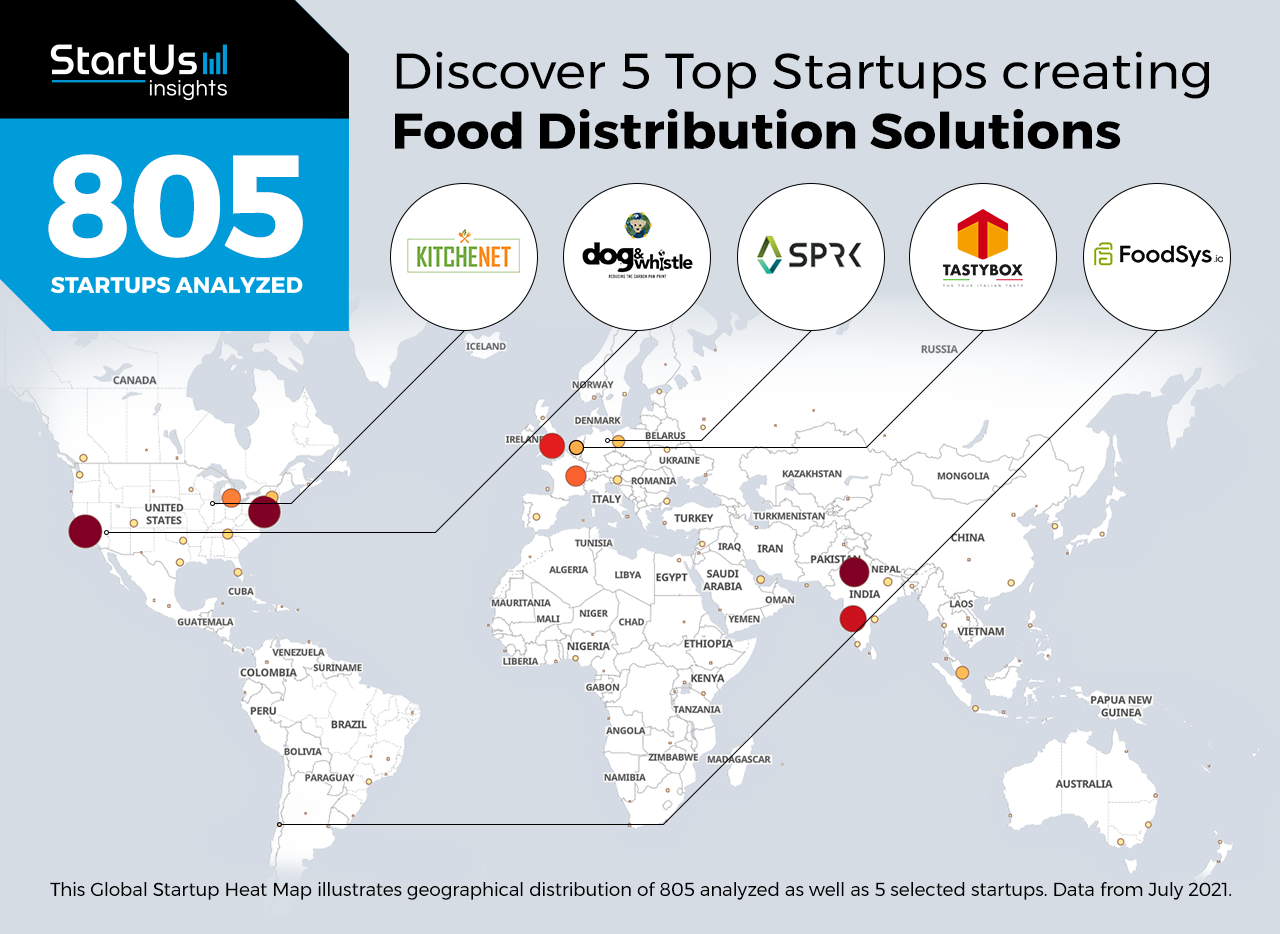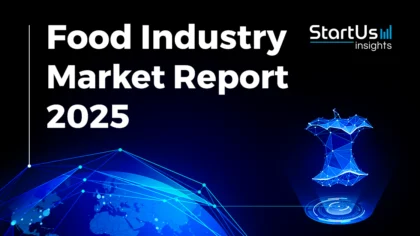Staying ahead of the technology curve means strengthening your competitive advantage. That is why we give you data-driven innovation insights into the food industry. This time, you get to discover 5 hand-picked food distribution solutions.
Global Startup Heat Map highlights 5 Top Food Distribution Solutions out of 805
The insights of this data-driven analysis are derived from the Big Data & Artificial Intelligence-powered StartUs Insights Discovery Platform, covering 2.093.000+ startups & scaleups globally. The platform gives you an exhaustive overview of emerging technologies & relevant startups within a specific field in just a few clicks.
The Global Startup Heat Map below reveals the distribution of the 805 exemplary startups & scaleups we analyzed for this research. Further, it highlights 5 startups providing food distributions solutions that we hand-picked based on criteria such as founding year, location, funding raised, and more. You get to explore the solutions of these 5 startups & scaleups in this report. For insights on the other 800 food distribution solutions, get in touch.
FoodSys offers a Blockchain-based Food Distribution System
By creating traceable and transparent supply chains for food companies, manufacturers, producers, processors, and consumers gain clarity about the food they buy. However, a lack of transparency leads to a faulty end-to-end tracking of the food supply. Hence, startups develop blockchain-based food distribution systems to make supply chains more transparent and secure.
Chilean startup FoodSys offers a transparent food marketplace using blockchain to meet food demand in restaurants and hotels as well as for storage. The startup brings together food producers from all over Chile and generates a distributed model that allows stakeholders to send and receive food. It also introduces a food intelligence system to optimize operations and reduce human interaction. As a result, the startup enables large-scale automation along the food supply chain. FoodSys also offers delivery logistics infrastructure to easily transport goods from producers to businesses.
KitcheNet distributes Freshly Packed Fruits to Offices
Due to the continuous office run, there is an increase in unhealthy lifestyles. However, corporate consumers are now shifting towards a healthy and balanced food system. Hence, food startups develop new food distribution models like delivering fresh food to offices. Such systems, when boxed as salads or cut fruits, provide easy access to simple and nutritious ways of eating every day.
US-based startup KitcheNet offers a just-in-time sourcing and curation model to deliver vegetables and fruits in offices and urban areas. Distributors hand-pick and create the office’s weekly selection using fresh food from the local market. To guarantee product quality, for example, a majority of the fruits that are sourced globally are sent to the customers on the day they arrive. The startup works with fruits like kiwis, pears, and dragon fruit as well as vegetables like potatoes, tomatoes, carrots, and bell peppers.
SPRK offers an AI-Based Platform to Redistribute Food
Worldwide, billions of tonnes of food are wasted every year due to food oversupply or poor distribution. To redistribute this food to the needy and reduce the overall carbon footprint, startups and food ventures create digital platforms based on machine learning (ML) and artificial intelligence (AI). Such tools identify excess food supply and redirect it to regions that face food scarcity.
German startup SPRK offers an AI- and ML-based food distribution platform. The platform connects food oversupply from restaurants and retailers with demand partners like non-government organizations (NGOs) and local food processing groups. At the same time, the AI studies the supply chain patterns to anticipate bottlenecks or wastage, enabling a rapid redistribution of oversupply. This further reduces waste, as well as carbon dioxide (CO2) emissions, in the environment.
TastyBox offers Food Vending Machines for Employees
With an increase in employees working during nights and early mornings, it becomes tough to get healthy meals at odd hours. Therefore, considering the demand for food at odd hours, startups offer automated solutions to prepare food. For example, they offer preservative-free food through easy-to-use vending machines, which are healthier than processed snacks.
Dutch startup TastyBox offers food distribution through vending machines in retail stores, offices, and public spaces. The startup solves the unavailability of meals during off-peak hours and also provides meals to consumers with dietary preferences and restrictions. Their food is preservative-free and, hence, healthier to consume when compared to conventional off-peak time food options. Their meals generally consist of Italian cuisines and are pre-cooked and blast-chilled before consumption. The startup’s first vending machines are located at the Delft University of Technology and DUWO facility.
Dog & Whistle offers Freshly Prepared Dog Food
Commercial and packaged foods for pets and dogs contain preservatives and are also not fresh. If consumed for a long period of time, they cause gastric issues in dogs due to the lack of fiber in the diet. Therefore, startups produce food that is freshly prepared and distributed, as well as customized, according to the dog’s specific requirements.
US-based startup Dog & Whistle distributes a fresh, lightly-cooked diet for dogs. They support local businesses by sourcing meat and vegetables directly from farmers. Dog & Whistle produces food in USDA-approved kitchens, in turn, controlling every part of the production process. The startup also doesn’t add any preservatives to the dog food, making it a safer and healthier option for dogs and dog-owners.
Discover more Food Tech Startups
Food startups such as the examples highlighted in this report focus on AI-based food distribution management, food redistribution as well as distribution of fresh food for underserved markets. While all of these technologies play a major role in advancing the food industry, they only represent the tip of the iceberg. To explore more food technologies, simply get in touch to let us look into your areas of interest. For a more general overview, you can download our free FoodTech Innovation Report to save your time and improve strategic decision-making.


![Food and Beverage Industry: Top 10 Technology Trends [2025 & Beyond]](https://www.startus-insights.com/wp-content/uploads/2024/11/Food-and-Beverage-Industry-Trends-SharedImg-StartUs-Insights-noresize-420x236.webp)






